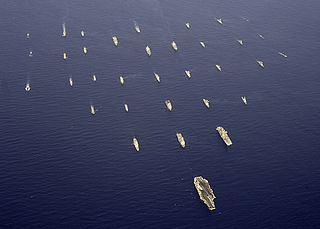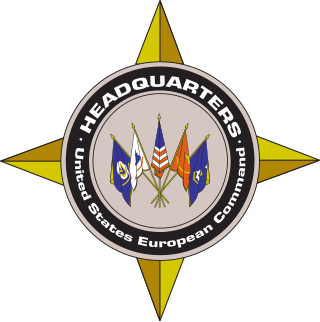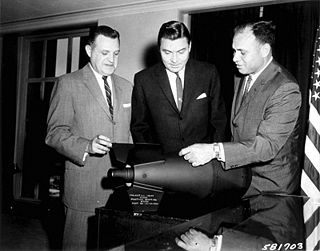Related Research Articles
The French Armed Forces encompass the Army, the Navy, the Air and Space Force, the National Guard and the Gendarmerie of the French Republic. The President of France heads the armed forces as chef des armées.

Ramstein Air Base is a United States Air Force base in Rhineland-Palatinate, a state in southwestern Germany. It serves as headquarters for the United States Air Forces in Europe – Air Forces Africa (USAFE-AFAFRICA) and also for NATO Allied Air Command (AIRCOM). Ramstein is located near the town of Ramstein-Miesenbach, which stands outside the base's west gate, in the rural district of Kaiserslautern.
The Atlantic Council is an American think tank in the field of international affairs, favoring Atlanticism, founded in 1961. It manages ten regional centers and functional programs related to international security and global economic prosperity. It is headquartered in Washington, D.C. It is a member of the Atlantic Treaty Association.

Standing Royal Navy deployments is a list of operations and commitments undertaken by the United Kingdom's Royal Navy on a worldwide basis. The following list details these commitments and deployments sorted by region and in alphabetical order. Routine deployments made by the Navy's nuclear-powered submarines and their location of operations is classified.

Power projection is a term used in military and political science to refer to the capacity of a state to deploy and sustain forces outside its territory.

A blue-water navy is a maritime force capable of operating globally, essentially across the deep waters of open oceans. While definitions of what actually constitutes such a force vary, there is a requirement for the ability to exercise sea control at long range.

The United States European Command (EUCOM) is one of the eleven unified combatant commands of the United States military, headquartered in Stuttgart, Germany. Its area of focus covers 21,000,000 square miles (54,000,000 km2) and 51 countries and territories, including Europe, Russia, Greenland, and Israel. The Commander of the United States EUCOM simultaneously serves as the Supreme Allied Commander, Europe (SACEUR) within NATO, a military alliance. During the Gulf War and Operation Northern Watch, EUCOM controlled the forces flying from Incirlik Air Base.

Military geography is a sub-field of geography that is used by the military, as well as academics and politicians, to understand the geopolitical sphere through the military lens. To accomplish these ends, military geographers consider topics from geopolitics to physical locations’ influences on military operations and the cultural and economic impacts of a military presence. On a tactical level, a military geographer might put together the terrain and the drainage system below the surface, so a unit is not at a disadvantage if the enemy uses the drainage system to ambush it, especially in urban warfare. On a strategic level, an emerging field of strategic and military geography seeks to understand the changing human and biophysical environments that alter the security and military domains. Climate change, for example, is adding and multiplying the complexity of military strategy, planning and training. Emerging responsibilities for the military to be involved in: protection of civilian populations, women and ethnic groups; provision of humanitarian aid and disaster response (HADR); new technology and domains of training and operations, such as in cybergeography, make military geography a dynamic frontier.
If a general desired to be a successful actor in the great drama of war, his first duty is to study carefully the theater of operations so that he may see clearly the relative advantages and disadvantages it presents for himself and his enemies.
The military of the United States is deployed in most countries around the world, with between 150,000 to 200,000 of its active-duty personnel stationed outside the United States and its territories. This list consists of deployments excepting active combat deployments, which consist of troops in Iraq and Syria. The exact number of these troops is currently in flux due to troop withdrawals.

The United States under secretary of defense for policy (USDP) is a high level civilian official in the United States Department of Defense. The under secretary of defense for policy is the principal staff assistant and adviser to both the secretary of defense and the deputy secretary of defense for all matters concerning the formation of national security and defense policy.
The Defence of Australia Policy was Australia's dominant defence policy between 1972 and 1997. The policy was focused on the defence of continental Australia against external attack. The Australian Defence Force was tailored to defending Australia rather than developing capabilities to operate outside Australian territory.

A tactical nuclear weapon (TNW) or non-strategic nuclear weapon is a nuclear weapon which is designed to be used on a battlefield in military situations mostly with friendly forces in proximity and perhaps even on contested friendly territory. Generally smaller in explosive power, they are defined in contrast to strategic nuclear weapons, which are designed mostly to be targeted at the enemy interior away from the war front against military bases, cities, towns, arms industries, and other hardened or larger-area targets to damage the enemy's ability to wage war.

Bulgarian–American Joint Military Facilities were established by a Defence Cooperation Agreement signed by the United States and Bulgaria in April 2006. Under the agreement, U.S. forces will train at these bases, which remain under Bulgarian command and under the Bulgarian flag.
The String of Pearls is a geopolitical hypothesis proposed by United States political researchers in 2004. The term refers to the network of Chinese military and commercial facilities and relationships along its sea lines of communication, which extend from the Chinese mainland to Port Sudan in the Horn of Africa. The sea lines run through several major maritime choke points such as the Strait of Mandeb, the Strait of Malacca, the Strait of Hormuz, and the Lombok Strait as well as other strategic maritime centres in Pakistan, Sri Lanka, Bangladesh, the Maldives, and Somalia.

Black Sea Area Support Group (BS-ASG), is a United States European Command initiative executed by U.S. Army Europe (USAREUR) designed to strengthen relationships between the United States and its Eastern European allies. This program is an innovative element of the Theater Security Cooperation program that focuses on enhancing partner capacity and fostering regional cooperation. TF-East provides the U.S. and its partners in Romania and Bulgaria with training facilities and, currently, a periodic integrated combined staff that stands up to facilitate combined training.
Overseas military bases of the United Kingdom enable the British Armed Forces to conduct expeditionary warfare. Bases tend to be located in or near areas of strategic or diplomatic importance, often used for the build-up or resupply of military forces, as was seen during the 1982 Falklands War and the use of RAF Ascension Island as a staging post. Most of the bases are located on British Overseas Territories or former colonies which retain close diplomatic ties with the British government.
The Integrated Review of Security, Defence, Development and Foreign Policy, often known as the Integrated Review, and titled as Global Britain in a Competitive Age, is a review by the British Government into the foreign, defence, security and international development policies of the United Kingdom. Described by Prime Minister Boris Johnson as "the largest review of its kind since the Cold War", the review was published on 16 March 2021.

In December 2019, Iraq and the United States began discussing the partial withdrawal of American combat troops from Iraq. In January 2020, during massive protests and following an escalation of tensions between the United States and Iran, the Iraqi Council of Representatives passed a non-binding measure to "expel all foreign troops from their country," including American and Iranian troops. Following the vote, U.S. president Donald Trump initially refused to withdraw from Iraq, but began withdrawing forces in March.
References
- ↑ "Forward basing". Britannica. Retrieved 1 September 2021.
- ↑ "Overseas Basing of U.S. Military Forces" (PDF). National Defense Research Institute.
- ↑ "US Military Policy in the Middle East" (PDF). Chatham House. Retrieved 1 September 2021.
- ↑ "Boosting NATO's presence in the east and southeast". NATO. 26 April 2016. Retrieved 1 September 2021.